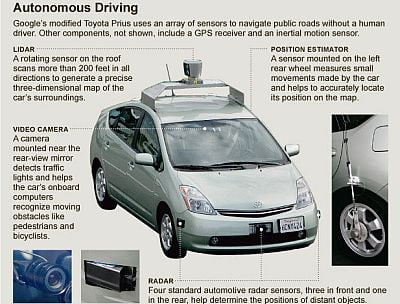Originally published in the Daily Maverick
 One of the things that allowed this species to survive into the 21st century is our ability to detect patterns, and to make predictions based on those patterns. If you were a hunter, you’d have needed to be able to predict the movement of the beasts you hunt with some degree of accuracy. If you were a farmer, some rough understanding of seasons would have been rather useful, lest you waste all your seed, your water, and all your effort.
One of the things that allowed this species to survive into the 21st century is our ability to detect patterns, and to make predictions based on those patterns. If you were a hunter, you’d have needed to be able to predict the movement of the beasts you hunt with some degree of accuracy. If you were a farmer, some rough understanding of seasons would have been rather useful, lest you waste all your seed, your water, and all your effort.
We’re here and it’s 2013, which means that our forebears got these sorts of things right with reasonable regularity. Sufficient numbers of them managed to feed themselves, and avoided walking off the edges of cliffs or getting eaten by carnivores. But all of that pattern-recognition and the accompanying storytelling can be a liability, in that it gets in the way of our realising that we are simply one data point, usually interesting only to ourselves and our immediate circle.
And, it gets in the way of seeing other potential stories. Not just the stories of others (helping us to escape our subjectivities), but also the story the data tells by itself, without our fears, hopes, and histories being allowed to corrupt it.
You know your own examples, but the sorts of corruption I mean would include our thinking that problem gambling is significantly prevalent in South Africa just because Aunt Sally has a problem. It’s not, at least not by international standards. Or, when your cold goes away a couple of days after taking some homeopathic remedy, when your confirmation bias allows you to ignore the fact that a cold typically only lasts for a couple of days in any case.
The storytelling I speak of is not just in ascribing patterns to potentially unconnected events, but also in finding intentionality or causality where none might exist. Intentionality, such as that we imagine when describing a tragedy as part of “God’s plan”, because doing so helps to shield us from the fact that we are meaningless. Causality, of the sort we might think we’ve found when some sort of “lucky” token or behaviour correlates with a random moment of good fortune.
The cognitive rules of thumb (or heuristics) that we use in developing these responses served a purpose in allowing us to get this far, and still serve a purpose today. But we no longer need to be as reliant on them, and are increasingly irrational when we do so, because the volume of data available to us is mostly far better suited to analysis by machines than by humans.
The South African National Blood Service illustrates the problem well, introducing all sorts of moral complications at the same time. As reported in the Cape Argus, a gay couple recently had their blood donation deferred (or rejected), thanks to the SANBS policy of deferring donations from men who have had sex with other men in the last six months.
One narrative that fits this policy is that the SANBS is homophobic, and this narrative has enjoyed strong support on social media for the last few days. But as I wrote in a 2011 column, deferring blood from this category of donor isn’t atypical, and South Africa’s blood service is in fact fairly liberal in this regard. In the UK, the deferral period is one year, while in the US a lifetime restriction applies for men who have had any sexual encounter with another man at any time since 1977.
Now, there’s no principled reason why we should think the US or UK a good guide to policy in this or any other instance. But there’s also no reason to be guided by the perception of discrimination based on moral judgement, where the discrimination might instead be based on cold, impersonal data.
As I note above, this is exactly the problem: we struggle to think of ourselves as mere data points, and instead wish for the world to bend to shape our anecdotal experiences (or anecdata). I have little reason to doubt the statistics reported – across various international jurisdictions – on the Centers for Disease Control website, or the FDA’s reasoning for why they defer blood donations from men who have sex with other men.
The statistics show that this group are “at increased risk for HIV, hepatitis B and certain other infections that can be transmitted by transfusion”. This claim is either true or false, and whether it is true or false is not a matter of morality or preference – just like it’s either true or false that tattoos and body piercings lead to increased risk of hepatitis C (the current motivation for a 6-month deferral period in Canada).
So, we can either contest the claim on empirical grounds, and refute the claim of increased risk from blood donations from men who have sex with other men, or we can claim inconsistency, saying that if this is true, that there is also increased risk from heterosexual couples who have anal sex.
In a recent interview on CapeTalk567, a representative of the SANBS seemed to concede the possibility of this sort of inconsistency, saying that they would be considering this in the upcoming revisions to their donation forms.
But even if this inconsistency is borne out by the data – in other words, if other categories of donor exist whose blood donations are, in general, at least as (or more) dangerous than this category is – this wouldn’t mean that more gay men should donate blood. It would mean that they still shouldn’t, and that neither should some other people. So the complaints to the SANBS regarding discrimination are never likely to bear the fruit that some potential gay donors are hoping it does, unless it’s empirically false that this category of donated blood is more risky.
My use of the word “shouldn’t” (as opposed to couldn’t) in the previous paragraph alludes to an important point. As much as we’d all like to give blood, another aspect of treating ourselves as a data point – at least when thinking about public policy – is that we’ve got very strong reasons for wanting to be able to trust that we could receive donated blood safely. So the issue of which deferrals are legitimate, and which are not, is important enough to merit resolution by careful reflection and analysis, rather than to simply be the subject of this week’s bout of righteous indignation.




















